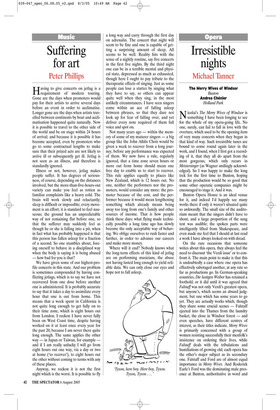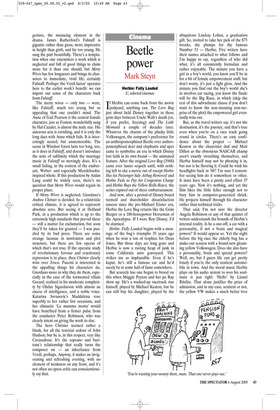Irresistible nights
Michael Tanner
The Merry Wives of Windsor Buxton Andrea Chénier Holland Park
Nicolai’s The Merry Wives of Windsor is something I have been longing to see for the whole of my opera-going life. No one, surely, can fail to fall in love with the overture, which used to be the opening item of very many concerts when they began in that kind of way. Such irresistible tunes are bound to come round again later in the work, and I found, when I first got a recording of it, that they all do apart from the most gorgeous, which only recurs in Meistersinger (as Wagner smilingly acknowledged). So I was happy to make the long trek for the first time to Buxton, hoping that the production would be so good that some other operatic companies might be encouraged to stage it. And it was.
Buxton Opera House is an ideal venue for it, and indeed I’d happily see many works there if only it weren’t situated quite so awkwardly. The small size of the auditorium meant that the singers didn’t have to shout, and a large proportion of the sung text was audible; the spoken parts were intelligently lifted from Shakespeare, and even made me feel that I should at last read a work I have always looked on with dread.
On the rare occasions that someone writes about this opera, they always feel the need to discount ‘the Verdi issue’ or to confront it. The main point to make is that this is undoubtedly a case where one opera has effectively sabotaged another, at any rate so far as productions go. In German-speaking countries, Die lustigen Weiber has retained a foothold, or it did until it was agreed that Falstaff was not only Verdi’s greatest opera, but anyone’s, which seems an absurd judgment, but one which has some years to go yet. They are actually works which, though they share some crucial scenes — Falstaff ejected into the Thames from the laundry basket, the close in Windsor forest — and even speeches, have different centres of interest, as their titles indicate. Merry Wives is primarily concerned with a group of women resisting successfully their menfolk’s insistence on ordering their lives, while Falstaff deals with the tribulations and humiliations of growing old; each opera has the other’s major subject as its secondary one. Falstaff and Ford are of almost equal importance in Merry Wives. And Roderick Earle’s Ford was the dominating male presence at Buxton, authoritative in word and gesture, the menacing element in the drama. James Rutherford’s Falstaff is gigantic rather than gross, more impressive in height than girth, and far too young. He sang the part beautifully. There’s a temptation when one encounters a work which is neglected and full of good things to claim more for it than one should, but Merry Wives has few longueurs and brings its characters to immediate, vivid life; certainly Falstaff. Perhaps ‘the Verdi factor’ operates here to the earlier work’s benefit: we can import our sense of the characters back from Falstaff.
The merry wives — only two — were, like Falstaff, much too young but so appealing that one couldn’t mind. The Anne of Gail Pearson is the central female character, just as Fenton, wonderfully sung by Hal Cazalet, is almost the male star. His amorous aria is ravishing, and it is only the long duet with Anne which fails. It is interestingly scored, but unmemorable. The scene in Windsor forest lasts too long, too, as it does in Falstaff, and doesn’t introduce the note of sublimity which the marriage music in Falstaff so movingly does. It’s a small failing, in the context of the exuberant, Weberand especially Mendelssohninspired whole. If this production by Aidan Lang could be widely seen, there’s no question that Merry Wives would regain its proper place.
If Merry Wives is neglected, Giordano’s Andrea Chénier is derided. In a relativistic critical climate, it is agreed to represent absolute zero. But seeing it at Holland Park, in a production which is up to the extremely high standards that prevail there — still a matter for exclamation, but soon they’ll be taken for granted — I was puzzled by its bad press. There are some strange lacunae in motivation and plot structure, but there are few operas of which that’s not true. If the operatic study of revolutionary fervour and reactionary repression is in place, then Chénier clearly wins over Tosca. Puccini is interested in the appalling things his characters do, Giordano more in why they do them, especially in the case of the tormented villain Gerard, realised in his moderate complexity by Olafur Sigurdarson with almost an excess of intelligence, and a noble voice. Katarina Jovanovic’s Maddalena rose superbly to her rather few occasions, and her climactic ‘La mamma morta’ would have benefited from a firmer pulse from the conductor Peter Robinson, who was clearly intent on giving the work its due.
The hero Chénier seemed rather a blank, for all the tenorial ardour of John Hudson; but he is, in this respect, very like Cavaradossi. It’s the soprano and baritone’s relationship that really turns the composer on — an inheritance from Verdi, perhaps. Anyway, it makes an invigorating and refreshing evening, with no element of weakness on any front, and it’s not often an opera critic can conscientiously say that.












































 Previous page
Previous page